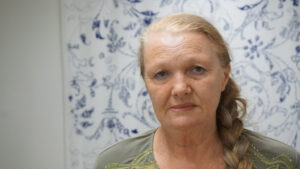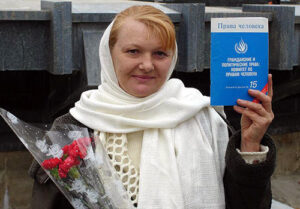Elena Urlaeva
Credentials
Humanitarian Cause
Ending Human Trafficking, Human Rights, Bonded Labor, Forced Labor, Modern Slavery, Rescue, Documenting and Reporting Human Rights Violations
Impact Location
Uzbekistan
Occupation
Activist / Head of the Human Rights Alliance of Uzbekistan
Photo Gallery
About
Elena Urlaeva is a tireless human rights defender who has faced persistent persecution for her courageous efforts to expose and combat the state-sponsored exploitation of forced labor in Uzbekistan, particularly in the cotton-picking industry. As a leading member of the Human Rights Defenders Alliance of Uzbekistan, Urlaeva’s work focuses on documenting violations of human rights that have plagued the country for years. Her activism is not only a personal mission but also a critical source of information for international organizations and human rights groups who have condemned Uzbekistan’s labor practices.
Urlaeva’s activism is grounded in her early life experiences. Born in Andijan in 1957, she pursued a technical career after graduating from Kharkov Hydrometeorological Technical School in 1980. She spent nearly two decades working for Uzbek television, before an incident involving her family drew her into the world of human rights. In 1998, Urlaeva’s brother became embroiled in a child custody dispute, and it was during this period that she first encountered the Uzbek authorities’ heavy-handedness. The experience galvanized her commitment to defending the rights of those oppressed by state mechanisms.
In 2006, Elena Urlaeva became the head of the Human Rights Alliance of Uzbekistan, a group of human rights defenders that operates informally, and she quickly became the target of government harassment. Over the years, she has been detained, beaten, and subjected to forced psychiatric treatment multiple times, as part of a systemic effort by the state to silence her work.
Despite the risks, Urlaeva has continued her work undeterred. She has organized public demonstrations advocating for freedom of association and assembly in a country where public protest is nearly unheard of. Her willingness to stand alone in protest, often armed only with a handmade placard, speaks to her courage and unwavering dedication to the causes she believes in.
“We are often the last straw that people who have no rights can clutch at.”
Urlaeva’s persistence in her advocacy against forced labor has made her a notable figure both locally and internationally. The evidence she and her colleagues gathered has revealed a comprehensive state policy of compelling citizens, including civil servants and students, to work in Uzbekistan’s cotton fields, often under conditions that amount to modern slavery. This practice, which also included child labor for many years, has been widely condemned by international bodies, including the International Labour Organization (ILO).
Her activism has not been limited to the fight against forced labor. In 2001, she led efforts to defend the rights of individuals who had lost their homes due to a road-building project. This led to her being detained and forcibly committed to a psychiatric hospital, where she was subjected to months of involuntary treatment, including being given strong psychiatric drugs without her consent.
This use of psychiatric hospitals to silence dissidents is a tactic that echoes back to the Soviet era, and it has been one of the main tools the Uzbek authorities have used against Urlaeva. Between forced hospitalizations, Urlaeva has been arrested and physically attacked on multiple occasions. In one particularly brutal instance in May 2015, she was detained by police and beaten after interviewing and photographing teachers and medical staff who had been forced by district authorities to work in cotton fields.
“Human rights defenders in Uzbekistan are a bit like the partisans—for instance, when they have to hide in the cotton fields with a camera to document forced labor. Sometimes we are the victims of lawless actions ourselves. We are assaulted, arrested, put on trial and thrown in jail.”
Through it all, Elena Urlaeva has continued to document abuses and share her findings with international human rights organizations. Her efforts have contributed to global awareness of Uzbekistan’s forced labor practices, which in turn led to international campaigns that pressured major global brands to boycott Uzbek cotton. As a result, the Uzbek government has gradually taken steps to reduce child labor, though the use of forced labor among teachers, doctors, and other civil servants remains a significant problem.
Urlaeva’s work in documenting forced labor has made her a key figure in the struggle for human rights in Uzbekistan. Her newsletters, disseminated through email, serve as one of the few consistent sources of independent information about the human rights situation in the country. In 2010, she received the Per Unger Prize in recognition of her extraordinary commitment to defending the rights of others, despite the significant personal cost. Even as she faces ongoing threats, her impact on the international campaign against modern-day slavery in Uzbekistan continues to resonate, driving change and bringing hope to those who are subjected to forced labor.


